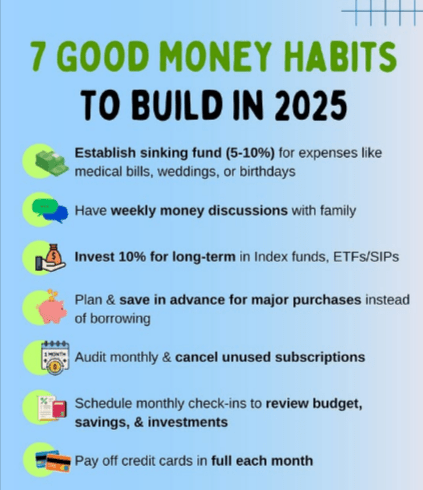Saving money is what the majority wish to do, particularly when the beginning of a new year is near. As the world has been changing so fast in 2025, it is more essential than ever that you deal with your finances effectively.
Whether you are saving up for a new phone, a holiday, or simply creating an emergency fund, these easy and effective methods will enable you to save money this year.
Step 1: Remember Last Year
It is useful to have some sense of where you are before you can move forward. Take a look back at last year’s spending. Where were you overspending? Did you spend it on eating, clothing, entertainment, or something else? If you understand where money is being wasted, you are in a better position to make more logical choices this time through.
For example, if you have spent a lot of money on dinner deliveries, you can decide to cook more of the meals yourself at home, so you spend less.
Step 2: Set Specific Goals
Having something concrete to save for makes saving much easier. Do you have a new laptop that you would like to buy? Should you save for a vacation? Or should we keep some money set aside in case of a rainy day?
Having something to save for makes it much easier to stay motivated. Break your goal into easier, smaller steps. That is, if you would like to save ₹10,000 in six months, save about ₹1,700 per month.
Step 3: Set up a Budget
A budget is a plan financially. It will tell you what you have, what you are spending, and how much you can put aside. A very easy method is the 50/30/20 rule:
- 50% on necessities (e.g., eating out, going places, supplies)
- 30% on pleasures (e.g., leisure and hobbies)
- 20% on savings
By remembering this principle, you can ensure that you are not spending more than you have and that you are saving your money for the future.
Step 4: Eliminate Unwanted Expenses
Monitor your spending and cut back on some things. Do you have unused subscriptions? Are you buying things you do not absolutely require? Cutting those expenses can free up money for savings. For example, you can save money if you cut back on an unused streaming service and use that money towards a more essential purpose.
Step 5: Save Automatically
One of the easiest ways to save is to make it automatic. Set up a system whereby some of your income automatically goes into a savings account. You will not be able to spend it then. Small amounts will also amount to a lot in the long run. For example, saving ₹500 a week can be equal to ₹26,000 in a year.
Step 6: Avoid Impulse Buying
It is just too easy to impulse shop, especially when you are doing it online. To prevent impulse shopping, employ the 24-hour rule: when you see something you want to purchase, wait 24 hours before you actually buy it. It will take a day to determine if you really need it and if you can afford it.
Step 7: How to Earn Extra Money
If you are willing to save more, try to find ways of earning extra income. You can:
- Provide tutoring services
- Pet-sitting or babysitting
- Sell your handmade crafts or paintings.
- Assist neighbors with domestic work.
- Earning extra money can enable you to achieve your savings goals sooner.
Step 8: Track Your Progress
Track your savings so that you can see how you are doing. Have a notebook, spreadsheet, or app where you can track your income, expenses, and savings. Seeing how far you have come can motivate you to keep going, and you can adjust if you need to.
Step 9: Learn About Investing
Once you have saved some money, you can learn to invest. The investment will grow your money in the future. Different types of investments are performed, such as stocks, bonds, or mutual funds. Research and familiarize yourself with the risks beforehand before moving forward.
Step 10: Be Consistent
Frugal saving is a behavior acquired over time. Be consistent in your spending, saving, and budgeting routine. Even if you feel the urge to spend, simply recall your goal and the reason why you are saving. These routines will become second nature to you over time.
Habits to Employee as a Leader for Holistic Wealth in 2025
Consider a class project where each child does what he or she is good at. Some can be good at drawing, some at writing, and some at speaking. When they all do what they are interested in, the project is a wonderful sight to see, and everyone is happy.
This is similar to a strengths-based work culture, where all team members know their strengths and utilize them on a daily basis. Suppose you are a leader who puts into practice the Habits for Holistic Wealth; you can create a culture where everyone has the potential to succeed. Here is how:
1. Team Members Feel Valued and Happy
When people use their strengths, they are more satisfied and confident. They enjoy doing what they are doing and tend to stay with the team for longer periods of time. This creates a healthy atmosphere where all the people support each other.
2. Customers Are Happier
Happy teams are likely to produce happy customers. When employees are happy working, they provide good service, and customers become happier and return more frequently.
3. Teams Are More Successful
Strength-based strategies make teams work more efficiently and effectively. They can accomplish more and realize their goals sooner, ushering in positive developments and success.
Real-World Example: Kin Restaurant
Kin, a restaurant located in Boise, Idaho, feels like family to its workers. They stand for cooperation, decent pay, and community service. By respecting the strength and well-being of each employee, Kin has experienced high worker retention, customer loyalty, and national recognition.
Final Thoughts
Saving money does not have to be hard. By taking into account where you live, having specific goals, budgeting, avoiding waste, saving on a regular basis, not spending on impulse buying, keeping track of your progress, learning how to invest, and remaining persistent, you can take control of your money and build a secure future.
Remember that every small step matters, and the more you do it, the more it will become second nature to you when it comes to managing money.

